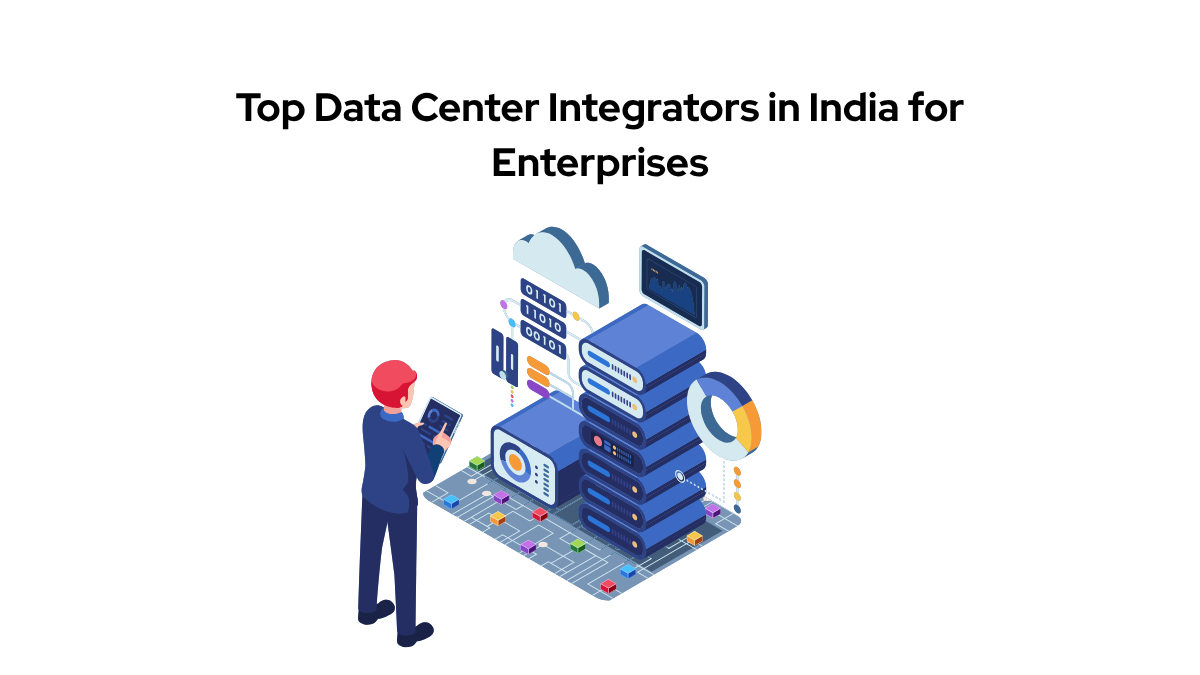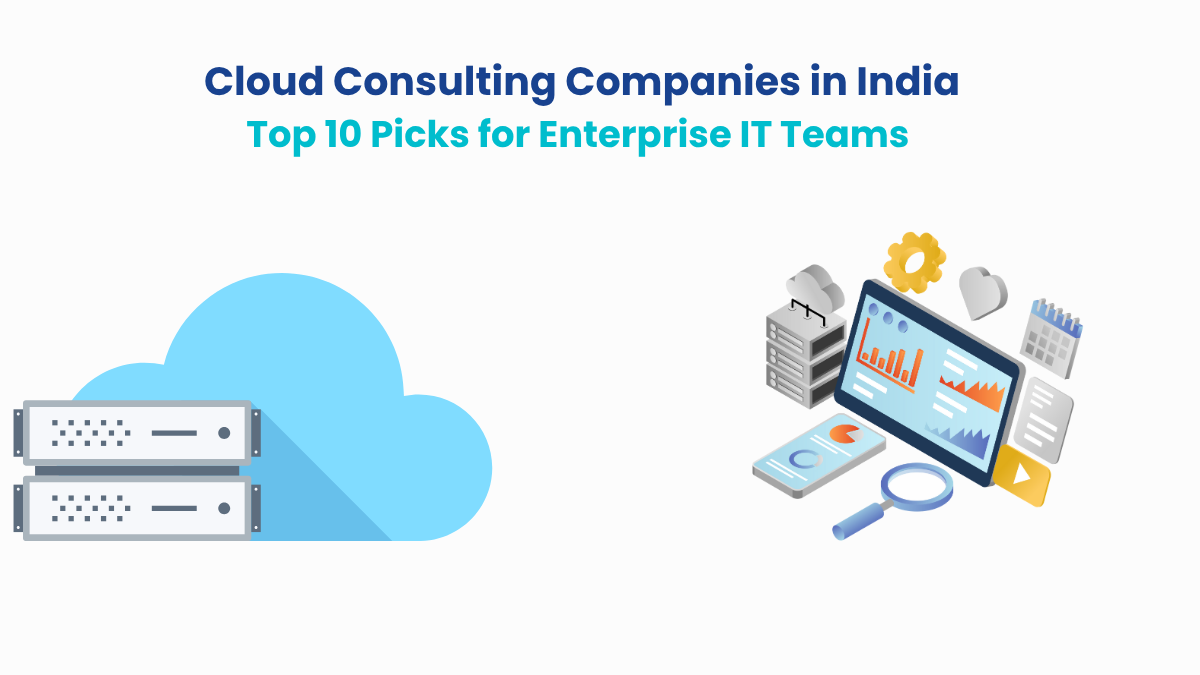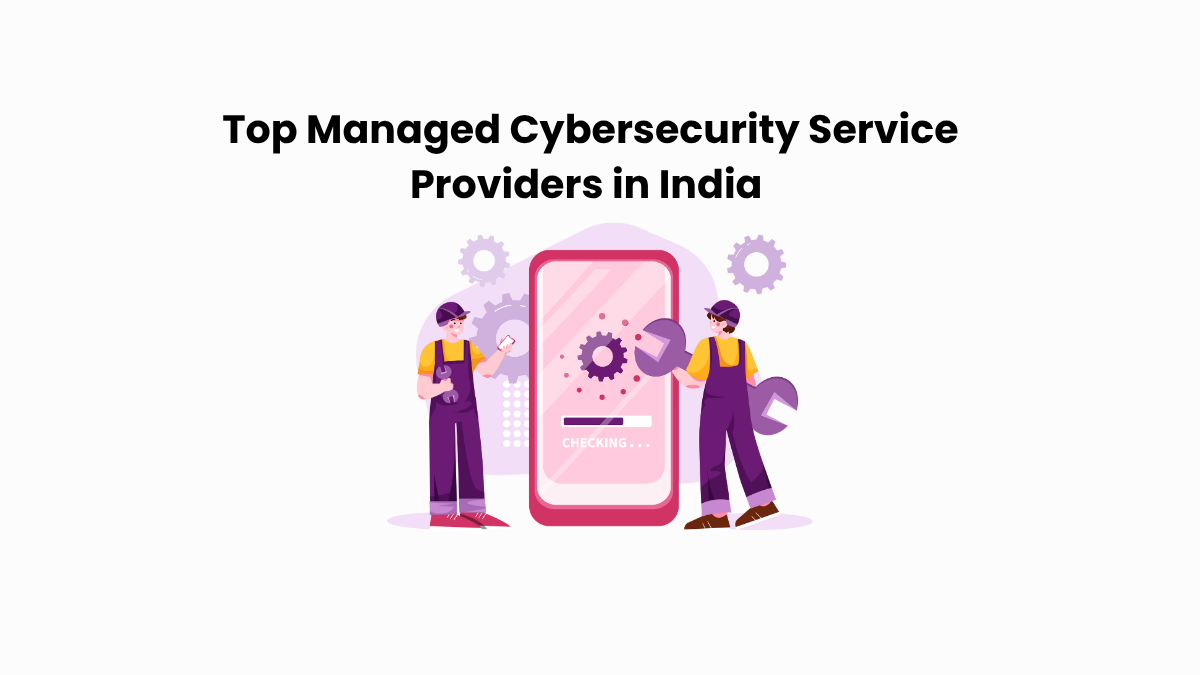Modern enterprises are hitting a wall inside their data centers. As multicloud strategies evolve, the pressure on core infrastructure grows. What once handled steady, predictable loads is now expected to support containerized apps, real-time data, and multiple cloud connections without missing a beat.
But most enterprise data centers weren’t designed for this. Legacy network fabrics, outdated segmentation models, and fragmented security policies create friction that no amount of patching can fix.
That’s why more IT leaders are searching for data center integrators in India. Not just hardware vendors, but experts who can rebuild the network spine, enable zero trust, and make hybrid and multicloud setups actually work.
In this article, we break down the top seven data center integrators in India trusted by large enterprises. If you are facing performance bottlenecks, security gaps, or an upcoming data center overhaul, this list will help you make the right decision the first time.
What to Look for While Choosing a Data Center Integrator in India?
Choosing the right data center integrator is not just about credentials or vendor logos. It is about finding a team that understands the nuances of enterprise-scale infrastructure. Because every link, switch, and policy affects performance, compliance, and uptime.
At this level, missteps are expensive and hard to reverse. So instead of chasing flashy offerings, it helps to focus on a few non-negotiables. Below we have listed the qualities that separate integration specialists from box-pushers. The kind of traits that show up not just during the RFP stage, but in the trenches, during rollout, and beyond.
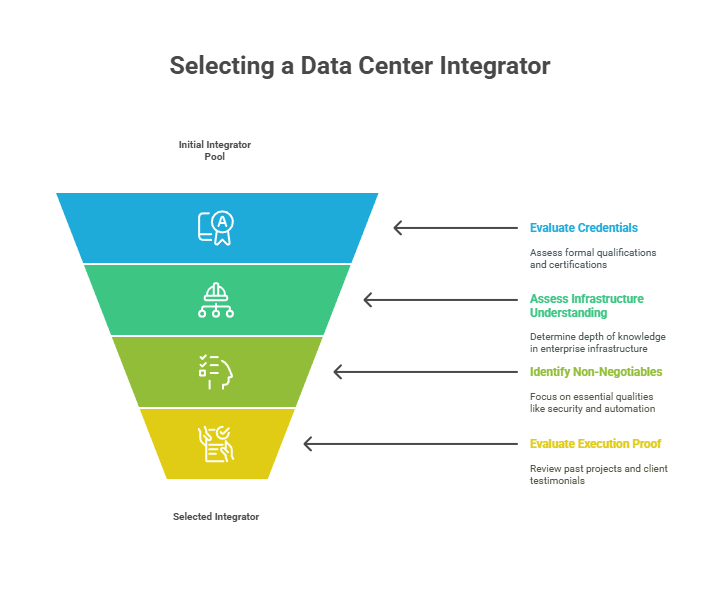
#1. Depth in Network Fabric Design
At the heart of any modern data center lies the network fabric. You want an integrator who understands technologies like EVPN and VXLAN not as buzzwords, but as tools to build scalable, secure, and high-performance environments. These architectures allow your systems to talk to each other across locations, clouds, and workloads with consistency and speed. If your integrator treats networking as an afterthought, you will feel the pain in every delayed deployment and dropped packet.
#2. Security That Starts at the Core
Zero Trust is not a product. It is a philosophy. And in data centers, it needs to be baked into the architecture from the very beginning. The right integrator will help you implement access control, microsegmentation, and inline threat detection across every touchpoint. Their designs should account for real-world attacker behavior and be able to adapt as your infrastructure grows.
Recommended Read: For a deeper dive into how modern SOC strategies complement Zero Trust and automation-first architectures, check out our recommended guide: Five Essential Steps to SOC Transformation.
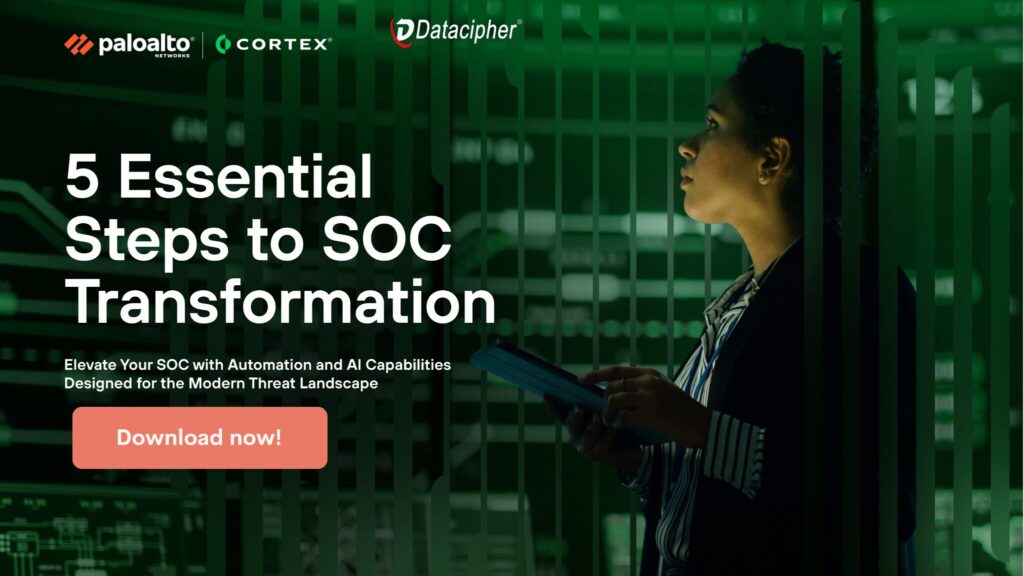
#3. Clarity around Multicloud Integration
If your business runs workloads across AWS, Azure, or GCP, your data center has to speak to those clouds in a native, secure, and efficient manner. This is more than just establishing a connection. It is about understanding routing, latency, traffic shaping, and policy enforcement across platforms. The right integrator will know how to simplify this complexity while keeping your controls centralized.
#4. Built-in Automation and Visibility
At enterprise scale, manual changes break things. Your integrator should help you move toward a world where infrastructure is code, and observability is non-negotiable. That means using proven tools to automate routine operations and providing dashboards that make system health and anomalies visible in real time.
This is what allows your teams to focus on strategy instead of firefighting. Without automation, even the most expensive architecture becomes a liability.
#5. Balanced Vendor Ecosystem
Some integrators are married to a vendor. The best ones are married to outcomes. You want a partner who is certified with Tier 1 OEMs but does not force-fit a particular product stack. A good integrator will assess what you already have, understand your operational model, and then recommend tools that play well together. Certifications help, yes, but alignment to your goals matters more than a logo on their pitch deck.
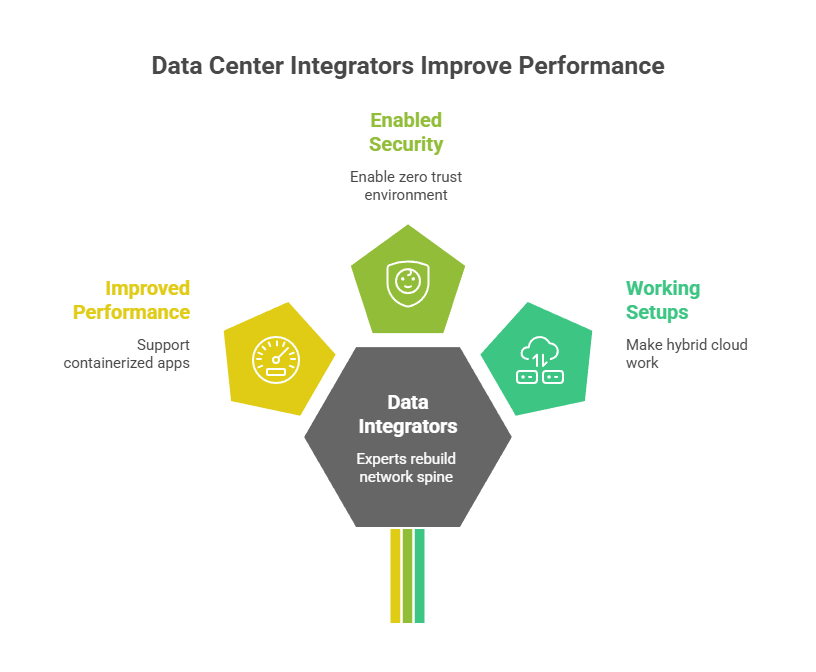
#6. Proof of Execution at Enterprise Scale
Nothing replaces experience. A credible integrator will have delivered successful data center rollouts for clients of similar scale and complexity. They will not hesitate to walk you through what worked, what failed, and how they adapted. It is vital to look for evidence of cross-domain work, across networking, security, automation, and cloud. The more complex the project, the more confident you can be in their ability to handle yours without excuses.
Now that we have covered what really matters when choosing a data center integrator, it is time to look at who delivers on those fronts. The following seven companies have consistently demonstrated their ability to meet the demands of modern enterprises.
Let us start with a closer look at Datacipher Solutions, a firm known for turning complex infrastructure needs into reliable, future-ready data center environments.
1. Datacipher Solutions
Datacipher has spent years helping enterprises rebuild their data center foundations, not with sweeping rebrands or vendor lock-ins, but with steady, network-level precision. Our approach centers on eliminating fragility at the core. This means re-architecting the data center fabric, embedding zero-trust security principles, and introducing automation layers that reduce complexity over time.
What we excel at is our ability to engage with deeply entangled legacy environments without slowing down delivery. For enterprises that need control, consistency, and confidence across their data center infrastructure, we are the preferred partner.
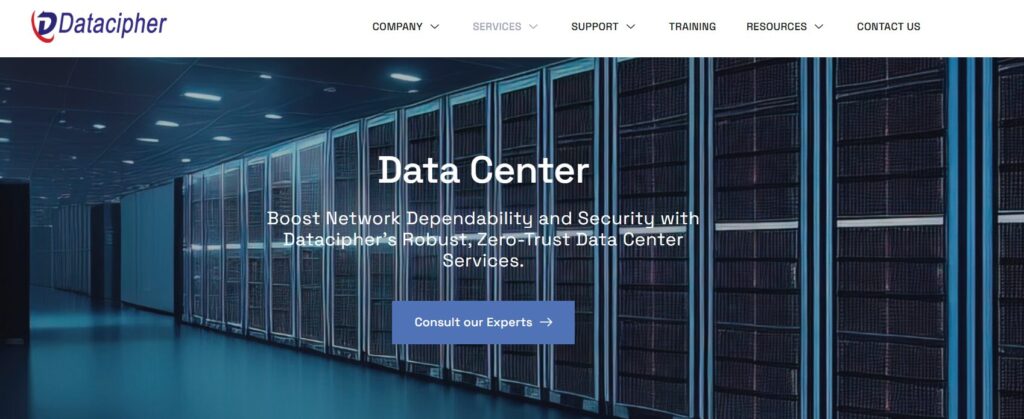
Source – Datacipher
Here’s what we offer:
EVPN-VXLAN-based Network Fabric:Datacipher helps enterprises transition from legacy flat networks to EVPN-VXLAN-based architectures that support high availability, workload mobility, and clean segmentation. This foundation is essential for any data center that must handle hybrid and multicloud workloads without routing chaos or policy sprawl.
Automated Network Lifecycle Management: Instead of treating automation as an afterthought, we build it into the fabric of the deployment. This includes leveraging intent-based networking principles and tooling that aligns with your operational workflows, so the infrastructure can scale without increasing manual effort.
Zero Trust Enforcement at Infrastructure Level: Datacipher integrates identity-aware segmentation, east-west traffic inspection, and dynamic access policies directly into the data center architecture. The result is a security model that adapts as workloads shift, without introducing latency or complexity at the hardware layer.
Multicloud and Inter-DC Connectivity: With hybrid cloud being the default for most enterprises, we ensure that on-premises data centers are securely and seamlessly connected to cloud environments. We work on building resilient transport layers, low-latency routing paths, and unified security overlays across data center and cloud endpoints.
High-Speed Fabric with 400G Readiness:For clients experiencing throughput bottlenecks, Datacipher designs high-speed data center networks using 100G and 400G interfaces with careful attention to redundancy, oversubscription ratios, and future upgrade paths. The goal is to keep the spine of the infrastructure strong enough to support next-generation applications.
Day 2 Operations and Proactive Visibility: Post-deployment, Datacipher equips enterprise teams with the tools and playbooks needed for day-to-day management. From anomaly detection to telemetry dashboards,our focus on observability ensures that operational issues are caught and resolved before they impact uptime or performance.
With Datacipher setting the tone for what modern data center integration should look like, it is worth exploring how other players in the Indian enterprise ecosystem measure up. While each integrator brings its own strengths, the real question is whether they can deliver with the same depth, reliability, and long-term alignment.
Let us now take a closer look at the second integrator on our list.
2. Microland
Microland works with enterprises to restructure legacy data center environments into more automated, connected, and manageable systems. Their strength lies in bringing structure to large-scale transitions, especially when multiple sites or legacy systems need to be consolidated without disrupting uptime.
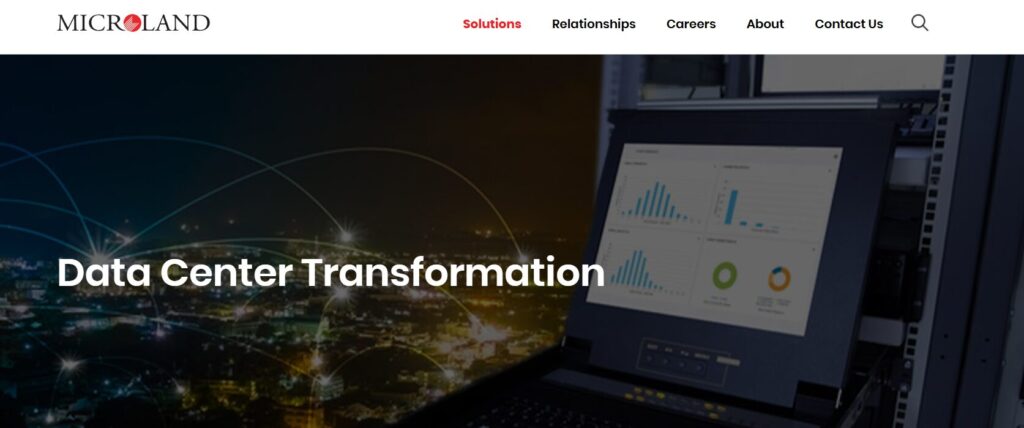
Source – Microland
They use migration factories and centralized management platforms to reduce variability and streamline operations. For enterprises moving toward hybrid infrastructure, Microland’s focus tends to be on improving control, visibility, and operational maturity rather than pushing a one-size-fits-all playbook.
It is a fit worth exploring if your priorities include methodical execution, platform alignment, and post-migration stability.
3. Inspira Enterprise
Inspira Enterprise supports data center modernization by focusing on secure infrastructure and hybrid readiness. They offer services such as infrastructure consulting, secure connectivity frameworks, and managed operations that maintain performance and policy enforcement across on-prem and cloud environments.
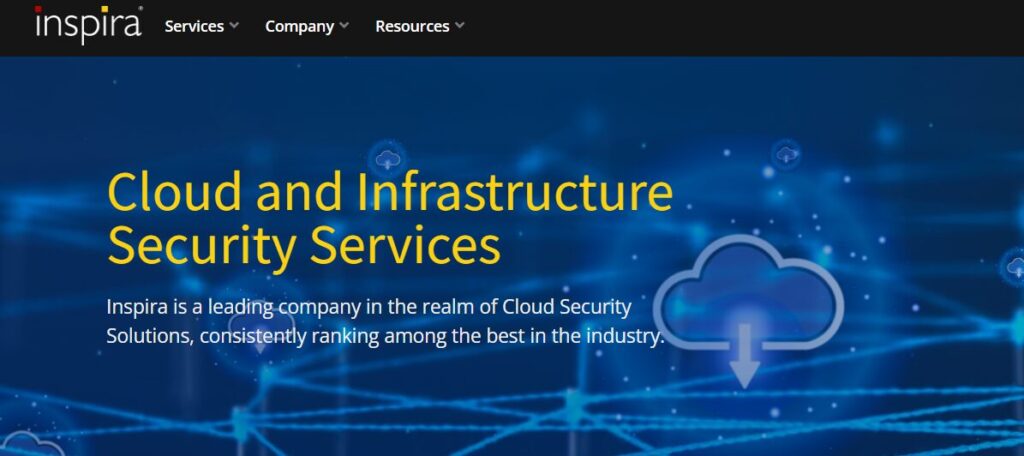
Source – Inspira
Their hybrid infrastructure offerings include software-defined components and network access control tools tailored for compliance-heavy industries. Inspira also operates remote operations through Cyber Fusion Centers, delivering centralized visibility and control over both physical and virtual layers.
For organizations seeking security-aware consistency and observability in hybrid data center environments, Inspira brings a viable integration framework.
4. Velocis Systems
Velocis provides enterprise-focused data center solutions that cover both physical infrastructure and hybrid cloud enablement. Their capabilities include converged and hyper-converged infrastructure, server and storage design, private cloud deployment, and data center network optimization.
The focus is on tailoring infrastructure to meet critical application demands while maintaining operational resilience.

Source – Velocis
They also support private cloud environments that allow for workload control and customization without losing the flexibility of cloud-native models. Combined with business continuity services and performance-focused network design, Velocis positions itself as a partner for enterprises looking to modernize their data centers without overhauling existing systems.
5. HCLTech
HCLTech provides a comprehensive suite of data center modernization and hybrid cloud capabilities. Their offerings include data center consulting, consolidation, virtualization, and hosting services. Their emphasis is on automation-driven operations using service orchestration and intelligent infrastructure tools.
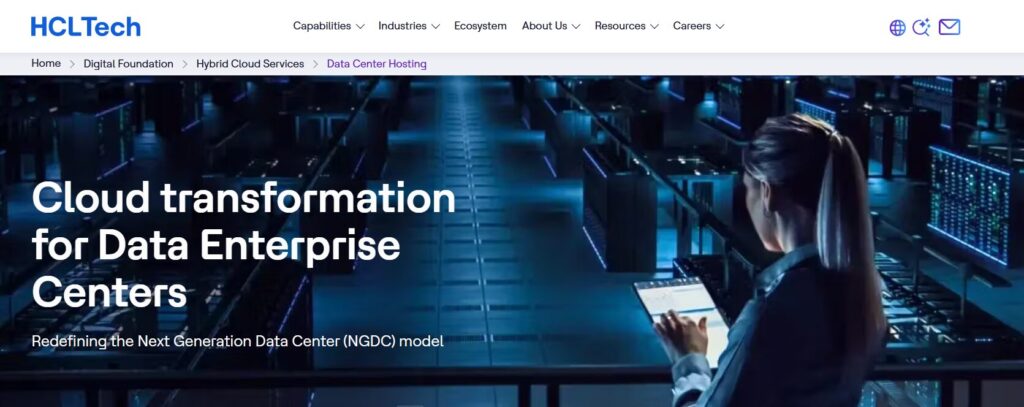
Source – HCLTech
They support infrastructure transitions by leveraging frameworks like their utility-based “Shared DCaaS” model and AI-enabled lifecycle management to balance cost, performance, and compliance requirements .
HCLTech combines physical data center services with cloud interconnect and software-defined infrastructure. Their approach often centers on standardized frameworks like V‑Transform that assess and rebuild legacy environments.
Enterprises concerned with managing hybrid workloads across on-prem and public clouds may find their orchestration-first model and pay‑as‑you‑grow hosting structure a practical option.
6. LTIMindtree
LTIMindtree delivers enterprise-grade data center modernization through a well-defined hybrid cloud and software-defined data center framework .
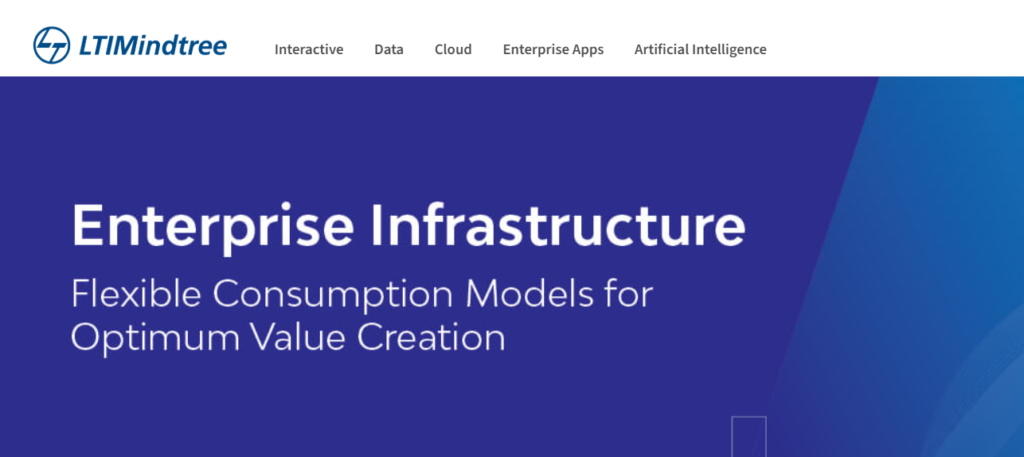
Source – LTIMindtree
Their offering includes rebuilding on-prem environments using hyperconverged infrastructure and private cloud platforms, tightly connected to public cloud resources, enabling flexible scaling and centralized governance.
Key to their delivery is the Digital Hybrid Infrastructure Platform, which provides unified control and visibility across compute, network, storage, and cloud workloads. This reduces operational silos and enables policy consistency.
LTIMindtree emphasizes automation and intent-driven operations, positioning network, storage, and compute under a single-pane operational view. Their platformized approach allows IT teams to orchestrate end-to-end provisioning, monitoring, and compliance.
These features are particularly valuable for enterprises managing complex, multi-platform environments. If you’re looking to modernize with a hybrid-first mindset, LTIMindtree’s platform approach offers a controlled yet extensible operational model.
7. Dynacons Systems & Solutions
Dynacons offers end-to-end data center integration services focused on infrastructure modernization and turnkey deployment. Their offerings include design and build of hyper-converged infrastructure, server virtualization, software-defined storage, enterprise backup, disaster recovery automation, and physical data center support like power, cooling, and access control.

Source – Dynacons
They manage both onsite and remote data center operations across multiple locations using a systems integration model tied to managed services. This enables enterprises to implement complex environments, while maintaining centralized visibility and support mechanisms.
Enterprises with extensive premises infrastructure or those requiring a single partner for integrating physical and virtual infrastructure may find Dynacons a practical match. Their capabilities span core infrastructure deployment through to operational continuity.
Having had a look at the top 7 integrators, it is time to ask the vital question: How to choose great from good?
How to Choose the Right Data Center Integrator: 5 Questions That Separate Leaders from Liability
Choosing a data center integrator is not about picking the most well-known name or the most affordable bid. It is about partnering with someone who understands your infrastructure as deeply as you do, and is ready to rebuild it for the future.
The wrong choice can cost more than just the budget. It can lock you into rigid architectures, increase your operational overhead, and expose your organization to compliance or performance risks that only surface months after go-live.
Before we explore our final recommendation, here are five questions that help you separate long-term partners from what we call “zombie integrators”. These are firms that look active on the surface, but fail to adapt, deliver, or support where it counts.
Five Questions to Ask Before Choosing a Data Center Integrator
#1. How do you approach network design in hybrid and multicloud environments?
It is a good idea to look for integrators who can speak confidently about EVPN-VXLAN, cloud interconnects, and traffic segmentation, not just hardware vendors. If they default to “it depends” without a framework, that’s a red flag.
#2. What part of the integration process do you automate, and how?
Manual provisioning, outdated scripts, and siloed monitoring still plague many so-called modern integrators. Ask how they handle automation from Day 0 to Day 2. Their answer should reference specific tools or workflows.
#3. How do you ensure observability and security across east-west traffic?
Zero trust is not just a slide in their deck. It needs to show up in how they handle access control, segmentation, and anomaly detection. If they only mention perimeter firewalls, you are dealing with yesterday’s playbook.
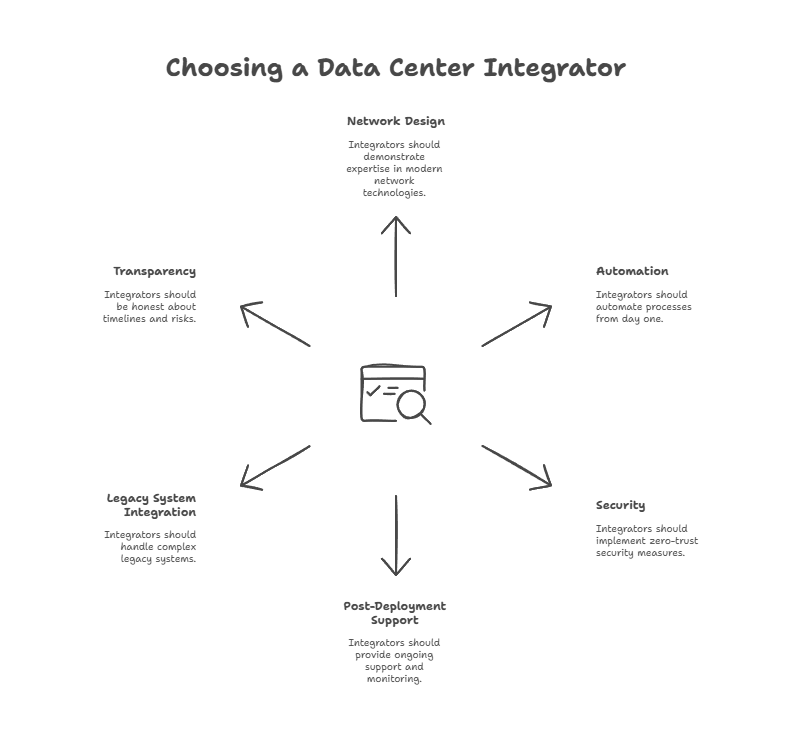
#4. What happens after go-live, who owns the run?
Many failures happen post-deployment: misaligned SLAs, poor alerting, no support for Day 2 operations. Ask about post-integration monitoring, support models, and how much of the stack they take responsibility for.
#5. Have you worked in environments with legacy systems, or just greenfield rollouts?
Every enterprise has baggage. This means overlapping systems, vendor lock-ins, and audit requirements. If the integrator only talks about fresh deployments, they may not be ready for the complexity of your environment.
#6. Can you give a transparent view of timelines, risks, and what you do not take on?
Good integrators are honest. If they say “yes” to everything without surfacing risks, chances are you will uncover them later, at your cost, not theirs.
Stack these questions against real-world delivery, and the difference becomes clear. Among the few integrators that consistently meet these expectations, one name stands out for both depth and dependability: Datacipher.
Why Datacipher is the Best Data Center Integrator for Enterprises in India?
Choosing the right integrator is no longer about who can wire up a rack or run a cloud migration checklist. For enterprises operating at scale, the real question is: who understands the full stack of risk, visibility, performance, and long-term manageability, from infrastructure to operations?
That’s where we come in.

At Datacipher, we don’t just integrate data centers. We engineer resilient environments built to withstand real-world security threats, compliance demands, and hybrid complexity from the very start.
Here’s what sets us apart as a data center integrator:
- We integrate with awareness, not just automation: From EVPN-VXLAN to hybrid interconnects, our solutions are built for scale, visibility, and operational clarity.
- We bring native cybersecurity into the fabric: As MSSP and security consultants, we embed Zero Trust policies, identity-aware controls, and east-west visibility from Day Zero.
- We don’t just go live; we help you stay resilient: Our strength lies in managing Day 2 operations, with proactive monitoring, anomaly detection, and infrastructure governance baked in.
Most integrators stop at deployment. We stay with the problem until it is solved, secured, and scalable.
To give you an example, a pan-India logistics company was struggling to modernize its primary data center. At the same time, they needed to extend secure connectivity to two regional sites and a cloud-native analytics platform.
Several integrators proposed hardware-heavy rollouts or vendor-aligned stacks. But what the client really needed was a layered approach. It was what could modernize the network fabric, enable secure east-west traffic, and bring observability under a single pane.
We approached the problem from the inside out. First, we re-architected the network spine for scalability and redundancy. Then we implemented Zero Trust access policies and extended cloud interconnects with consistent policy enforcement.
Finally, we delivered centralized visibility across sites, workloads, and users. What was once a fragile, siloed setup became a secure, high-performance platform that could support real-time logistics operations reliably and at scale.
In a space where many integrators focus on surface-level delivery, we bring clarity, control, and long-term resilience from Day 0 to Day 2.
Are you ready to move beyond integration and into operational confidence? Let’s talk. Our experts are here to guide you, from where you are to where you need to be.

